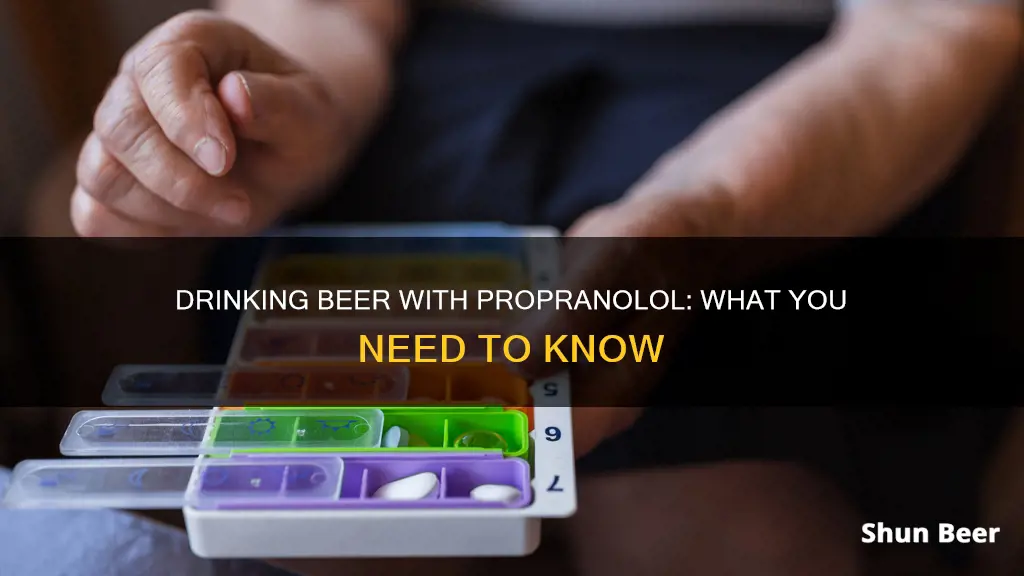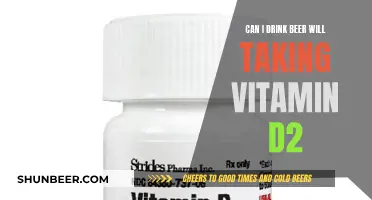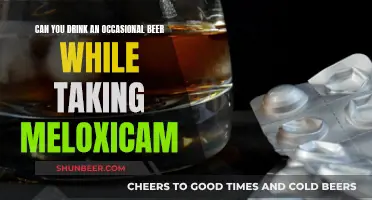
Propranolol is a beta-blocker medication that can be used to treat a range of health conditions, including social or performance anxiety, migraines, and heart problems. It is important to know how this medication interacts with alcohol, especially if you are taking it. Mixing alcohol and propranolol can cause some unpleasant and dangerous side effects. Both alcohol and propranolol can lower your blood pressure, so combining the two may cause your blood pressure to drop to dangerously low levels, a condition called hypotension. This can lead to symptoms such as dizziness, nausea, and fainting. Therefore, it is generally not advised to drink alcohol while taking propranolol, and people taking this medication should keep their alcohol intake low or stop drinking altogether.
| Characteristics | Values |
|---|---|
| Should I drink beer with propranolol? | Generally not advised by doctors or medical experts |
| Why? | Both propranolol and alcohol lower blood pressure, so the combination can make it dangerously low |
| What are the side effects of combining the two? | Fainting (especially when getting up too fast), nausea, inability to concentrate, dizziness, lightheadedness, changes in pulse or heart rate |
| What should I do if I experience side effects? | Let your doctor know and stop drinking alcohol until you know how the medication affects you |
| Can I drink alcohol at all while taking propranolol? | It is recommended to keep alcohol intake low or stop drinking completely, but a single drink of alcohol with a beta-blocker is not likely to cause serious side effects |
What You'll Learn
- Propranolol and alcohol can cause additive effects, lowering blood pressure to dangerous levels
- Mixing the two can lead to dizziness, nausea, and fainting
- Beta-blockers like Propranolol slow heart rate and reduce the force of each beat
- Alcohol can also lower blood pressure, acting as a blood thinner
- Doctors do not recommend drinking while taking Propranolol

Propranolol and alcohol can cause additive effects, lowering blood pressure to dangerous levels
Propranolol is a beta-blocker, a prescription-only medication that is used to treat a range of health conditions, including social or performance anxiety, migraines, and heart problems. Beta-blockers work by lowering blood pressure, slowing heart rate, and reducing the force of each heartbeat.
Alcohol also has a blood pressure-lowering effect. Drinking alcohol while taking propranolol can cause an additive effect, further reducing already lowered blood pressure to dangerous levels. This condition is called hypotension and can cause a range of side effects, including:
- Dizziness
- Nausea
- Lightheadedness
- Fainting
- Changes in pulse or heart rate
- Headache
- Inability to concentrate
These side effects are most likely to occur at the beginning of treatment, following a dose increase, or when treatment is restarted after an interruption. It is important to note that mixing propranolol and alcohol is generally not advised by doctors and medical experts. People taking propranolol should keep their alcohol intake low or stop drinking altogether. However, some people continue to drink in moderation while using propranolol, but it is important to exercise caution and consult a doctor.
Ashland, Alabama: Beer Drinking Laws and Regulations
You may want to see also

Mixing the two can lead to dizziness, nausea, and fainting
Propranolol is a beta-blocker, a prescription-only medication used to treat a range of health conditions, including social or performance anxiety, migraines, and heart problems. Beta-blockers work by lowering blood pressure, slowing the heart rate, and reducing the force of each heartbeat.
Alcohol also has a blood pressure-lowering effect. It does this by making blood vessels larger and acting as a blood thinner, preventing blood cells from sticking together.
In addition to dizziness, nausea, and fainting, other side effects of mixing propranolol and alcohol include an inability to concentrate, headache, lightheadedness, and changes in pulse or heart rate. These side effects are most likely to occur at the beginning of treatment, following a dose increase, or when treatment is restarted after an interruption.
It is important to note that drinking alcohol while taking propranolol is generally not advised by doctors or medical experts. People taking propranolol should keep their alcohol intake low or stop drinking altogether. However, some people do continue to drink in moderation while using propranolol. If you decide to mix the two, it is recommended that you wait until you see how the medication affects you before drinking alcohol, usually two to three days.
Beer and Zantac: Safe Mix or Health Risk?
You may want to see also

Beta-blockers like Propranolol slow heart rate and reduce the force of each beat
Beta-blockers like Propranolol are a group of medicines that slow heart rate and reduce the force of each beat. They work by blocking the effects of the hormones epinephrine and norepinephrine, which are also known as adrenaline and noradrenaline. This causes the heart to beat more slowly and pump with less force, lowering blood pressure.
Propranolol is used to treat heart problems, such as high blood pressure, irregular heartbeats (arrhythmia), and chest pain (angina). It can also be used to prevent future heart disease, heart attacks, and strokes. In addition, Propranolol can help with the physical symptoms of anxiety, like sweating and shaking, and prevent migraines.
When taking Propranolol, it is important to be cautious about drinking alcohol. Both Propranolol and alcohol can lower blood pressure, so combining them may cause a dangerous drop in blood pressure, known as hypotension. This can lead to side effects such as dizziness, nausea, and fainting. Therefore, it is generally not recommended to mix Propranolol and alcohol. If you decide to drink alcohol while taking Propranolol, it is important to do so in moderation and monitor how it affects you.
It is worth noting that Propranolol may also interact with other medications, such as other blood pressure medications, antidepressants, and asthma or COPD treatments. It is always advisable to consult a doctor or pharmacist before taking Propranolol with any other substances to ensure safe use.
Beer and Pfizer: What's the Safe Verdict?
You may want to see also

Alcohol can also lower blood pressure, acting as a blood thinner
Alcohol can lower blood pressure by making blood vessels larger and acting as a blood thinner, preventing blood cells from sticking together. This can be dangerous for people taking propranolol, a beta-blocker, as it also lowers blood pressure. The combination of the two can cause an additive effect, leading to a dangerous drop in blood pressure known as hypotension. This can result in side effects such as dizziness, nausea, light-headedness, and even fainting.
The risk of developing very low blood pressure is especially high for those taking other blood pressure medications in addition to beta-blockers. This includes alpha-blockers and calcium channel blockers, which primarily work by dilating arteries.
The negative effects of alcohol on blood pressure are also important for those taking propranolol for heart conditions. Excessive drinking or binge drinking can lead to cardiomyopathy or an irregular heart rate, negatively impacting the condition being treated.
Therefore, it is generally not advised by doctors or medical experts to mix alcohol and propranolol. People taking propranolol should keep their alcohol intake low or stop drinking altogether.
Beer and the HCG Diet: What You Need to Know
You may want to see also

Doctors do not recommend drinking while taking Propranolol
Alcohol can also lower your blood pressure and slow your heart rate, so when combined with Propranolol, there is a risk that your blood pressure could drop to dangerously low levels, a condition called hypotension. This can cause a range of unpleasant and dangerous side effects, including dizziness, nausea, lightheadedness, fainting, and changes in pulse or heart rate. These side effects are particularly likely at the beginning of treatment, following a dose increase, or when treatment is restarted after an interruption.
In addition, alcohol can have negative effects on the conditions that Propranolol is used to treat. For example, drinking alcohol can trigger or worsen anxiety, as it disrupts the balance of chemicals in the brain and triggers physical symptoms such as an increased heart rate, sweating, and trembling. Alcohol can also trigger migraine attacks, cause severe tremors in alcohol withdrawal, and increase pressure in the eye, worsening glaucoma.
While a single drink of alcohol with Propranolol is not likely to cause serious side effects, especially in people who tolerate beta-blockers well, it is still important to exercise caution. People who wish to continue drinking while taking Propranolol should discuss the risks and benefits with their doctor and explore alternative options. It is also important to note that suddenly stopping beta-blockers can cause life-threatening health issues, so people should not stop taking Propranolol just to drink alcohol.
Drinking Beer and Taking Bactrim: What You Need to Know
You may want to see also
Frequently asked questions
Doctors and medical experts do not advise mixing alcohol and propranolol. Both alcohol and propranolol can lower your blood pressure, so combining the two may cause your blood pressure to drop to dangerously low levels. This can lead to side effects such as dizziness, nausea, light-headedness, and fainting.
Mixing alcohol and propranolol can cause side effects such as dizziness, nausea, light-headedness, fainting, changes in pulse or heart rate, and an inability to concentrate. These side effects are more likely to occur at the beginning of treatment, after a dose increase, or when treatment is restarted after an interruption.
While a single drink of alcohol with propranolol is unlikely to cause serious side effects, it is still not advisable to mix the two without consulting a doctor first. People who wish to continue drinking while taking propranolol should discuss the risks and benefits with their doctor and explore alternative options.
Suddenly stopping propranolol may cause life-threatening health issues, such as thyroid storm, in people with hyperthyroidism. It is important to consult a doctor before stopping or starting any medication, including propranolol and alcohol.







